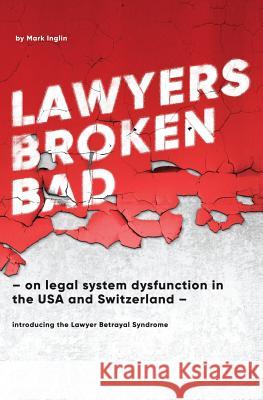Lawyers Broken Bad: - on legal system dysfunction in the USA and Switzerland - » książka
Lawyers Broken Bad: - on legal system dysfunction in the USA and Switzerland -
ISBN-13: 9781537661797 / Angielski / Miękka / 2016 / 178 str.
Today's highly dysfunctional legal system results in wrongful convictions and the ruination of innocent lives. Lawyers Broken Bad argues that the core problem stems from an imbalance of power in the highly personal lawyer-client relationship. While wrongdoing in the legal system is being exposed today as never before by mass media, the focus of that wrongdoing is rarely placed on damaging lawyer-client interactions. Vigorous legal defense of a client requires not only hard work by a lawyer, but also professional risk, as any exposure of wrongdoing, negligence or incompetence among fellow legal system players can threaten a defense lawyer's career. The easier path for a lawyer to achieve professional success has therefore become the betrayal of his own client, the "weakest link" in a chain of authority. At the same time, the legal system as a whole fails to adequately discourage client betrayal by defense lawyers, through its reluctance to address the problem or to impose sufficient penalties. Lawyers Broken Bad explains how the diabolical use of psychology has come to replace law in a lawyer's office. Two distinct legal systems are defined: Legal System 1- the legal system of myth and theory that we all hope to have, and Legal System 2- the legal system used in practice to achieve plea bargains, to avoid trials, and to protect members of the legal system itself from criticism. Legal System 2 encourages the betrayal of clients and can lead a client to suffer from the Lawyer Betrayal Syndrome. The Lawyer Betrayal Syndrome shares similarities with the familiar Stockholm Syndrome. While the Stockholm Syndrome refers to a circumstance in which a hostage-victim bonds emotionally with his captor under physical threat, the Lawyer Betrayal Syndrome is defined to consider that there is emotional bonding between a lawyer and his client resulting from threat and betrayal under the cover of law. The syndrome arises from the perceived need of a lawyer to impose control over a client, in order to prevent a continued claim of innocence and the wish to go to a trial. Lawyers Broken Bad sheds light on the unethical activities that are allowed to happen in the privacy of a lawyer's office, as it itemizes the psychological tactics that a lawyer uses in his private space under the cover of lawyer-client confidentiality. A reader of Lawyers Broken Bad will be forewarned about what could readily happen in a defense lawyer's office, and will thus be forearmed. Lawyers Broken Bad should be read by any client who is under lawyer representation; it should also accompany every client who enters a lawyer's office with the intent of hiring that lawyer.
Zawartość książki może nie spełniać oczekiwań – reklamacje nie obejmują treści, która mogła nie być redakcyjnie ani merytorycznie opracowana.











